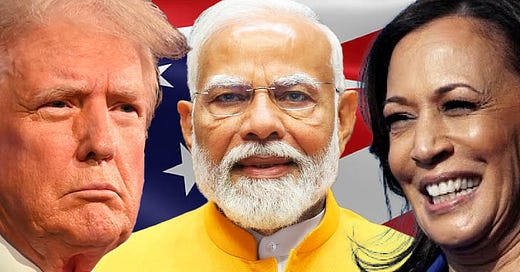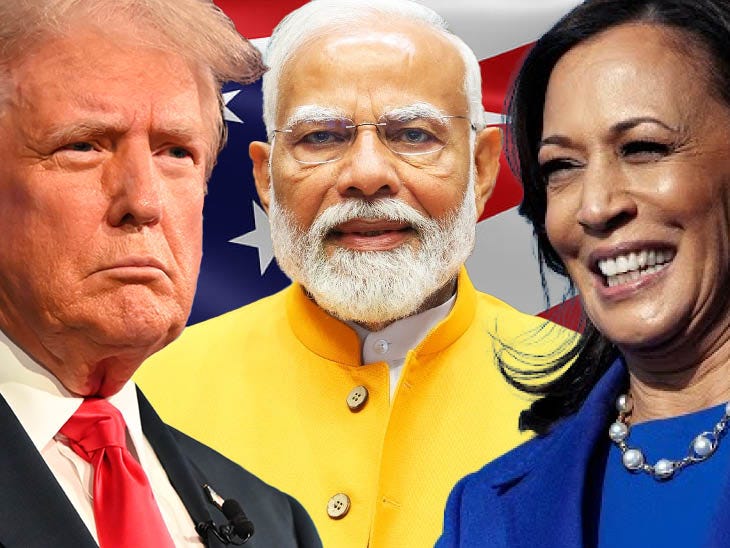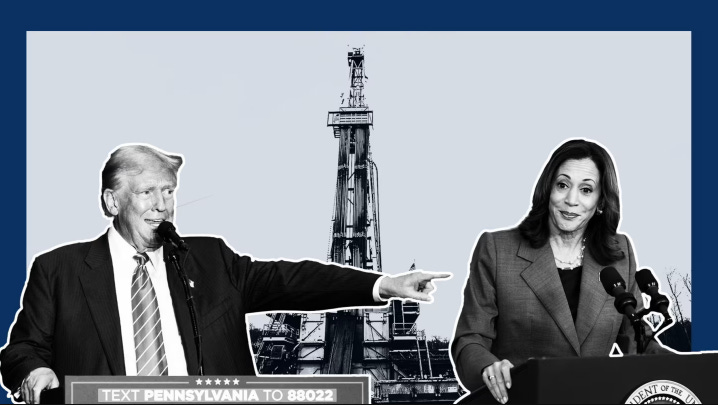US Presidential Elections 2024: Why A Trump Win Is Better For India's Future
As the United States gears up for a crucial presidential election, the implications extend far beyond its borders, particularly for global allies like India. The choice between Donald Trump and Kamala Harris will significantly influence not just American policy, but also India's position and progress in the evolving global landscape. With growing geopolitical challenges and a rapidly changing balance of power, a Trump presidency could offer India a more advantageous partnership that aligns with its strategic interests.
1. U.S.-China Relations
Trump: Aggressive Towards China and Soft on Russia: A Strategic Calculation-
Trump's administration has been characterized by an aggressive posture towards China, which aligns with India's strategic interests. Under Trump, the U.S. is likely to continue its efforts to contain China's influence in Asia, thereby reinforcing India's role as a counterweight in the region. This focus could lead to increased military and economic cooperation between the U.S. and India, particularly in defense procurement and technology sharing.
In contrast to his approach towards China, Trump has exhibited a more conciliatory approach towards Russia, recognizing that Moscow does not pose the same level of strategic threat as China. By maintaining dialogue with Russian leadership, Trump would aim to avoid escalating tensions that could detract from addressing the more pressing challenge posed by China's expanding influence. This nuanced understanding allows for a more balanced geopolitical strategy, enabling India to strengthen its ties with both the U.S. and Russia without being forced into a binary choice.
Harris’s Risk of Strengthening China-Russia Ties-
Conversely, a Harris's administration may adopt a more aggressive stance towards Russia while maintaining pressure on China. This strategy could inadvertently push Russia and China closer together (something which has already commenced post the Russia-Ukraine conflict), creating a stronger bloc that challenges U.S. interests globally. For India, this scenario is troubling as it complicates its delicate balancing act between its historical ties with Russia and its strategic partnership with the U.S.
2. Economic Policies and Trade
Economic Relations Under Trump-
While Trump's protectionist policies may initially appear detrimental to U.S.-India trade relations, they could ultimately benefit India by encouraging American companies to relocate their supply chains from China to India. This shift is driven by the need for diversification and risk mitigation, as U.S. businesses seek alternatives to Chinese manufacturing amid ongoing geopolitical tensions. For instance, companies like Apple have already begun to expand their production capabilities in India, with plans to manufacture a greater percentage of their devices in the country. This aligns with India's own "Make in India" initiative, aimed at boosting domestic manufacturing and creating jobs.
Despite such positives, concerns are being raised about Trump’s statements against India’s tariff regime vis-à-vis the US, and his characterization of India as a "tariff king." He has often criticized India's high tariffs on American products, particularly citing the 150% tariffs imposed on Harley-Davidson motorcycles as a significant barrier to trade. Critically, while some may view Trump's views as a potential hindrance to U.S.-India relations, they overlook the broader implications of his presidency for India's economic landscape. It is imperative to look at the bigger picture in this context, wherein any friction resulting from Trump's protectionist measures could be outweighed by significant benefits stemming from supply chain relocations and increased foreign investment in India. Thus, the deep economic interests shared between the U.S. and India are unlikely to diminish under Trump; rather, they may evolve in ways that enhance India's role in global supply chains.
Harris’s Focus on Multilateralism and Potential Barriers-
In contrast, Kamala Harris's administration may prioritize multilateral trade agreements that could impose stricter regulations on imports from developing nations like India. While these agreements would aim to create a level playing field, they could inadvertently limit India's export potential by introducing higher compliance costs and regulatory barriers. For example, stricter environmental and labor standards could be mandated under new trade pacts, making it more difficult for Indian exporters to compete effectively.
3. Human Rights as a Political Tool
Democrats’ Use of Human Rights Concerns-
Kamala Harris has been vocal about human rights issues, often for ideological reasons and to appeal to her voter base. This focus can lead to unsubstantiated scrutiny of India's internal policies regarding religious freedom and minority rights, potentially falsely undermining the nation’s image on the global stage. Further, Democrats tend to use such criticisms as political tools to exert pressure on countries like India to achieve their own objectives.
A More Pragmatic Approach Under Trump-
Donald Trump's approach to human rights is marked by a focus on addressing genuine issues rather than using them as a political tool for ideological gain, voter appeal or scoring foreign policy points. His administration has taken concrete actions to tackle significant human rights challenges that resonate with American interests and global stability. For instance, Trump's administration made notable strides in combating human trafficking, a pressing issue affecting millions worldwide.
Trump’s foreign policy, thus, allows India greater latitude in pursuing its national interests without the constant pressure of condescending U.S. moral judgments interfering with diplomatic relations. This pragmatic stance enables India to strengthen its global position while navigating its unique challenges, fostering a more constructive and flexible relationship with the United States—one that prioritizes shared goals over divisive rhetoric.
4. Immigration Policies
Trump’s Merit-Based Immigration System-
Trump champions a merit-based immigration system that prioritizes skilled individuals who can contribute to the U.S. economy. His proposed reforms aim to increase the share of legal immigrants selected based on skill from 12% to 57%, utilizing a points-based system that rewards qualifications like advanced degrees and job offers. This framework is particularly advantageous for Indian immigrants, many of whom possess the credentials that align with these criteria, facilitating smoother pathways for qualified professionals—especially in technology and engineering—to gain permanent residency.
Harris’s Lenient Approach-
In contrast, Kamala Harris as Vice President under the Biden administration has adopted a more lenient stance on illegal immigration, often framed under the guise of humanitarian concerns. This approach has led to an influx of illegal migrants entering the U.S., which poses significant challenges for resource allocation. The administration's emphasis on amnesty for refugees can inadvertently detract from resources available to legal immigrants, including those from India who are navigating the complex immigration process. As more undocumented individuals enter the country, competition for jobs, housing, and social services intensifies, making it increasingly difficult for skilled Indian immigrants to secure opportunities.
The ramifications of Harris's policies extend beyond immediate resource strain; they also foster an environment where legal immigrants may face heightened scrutiny or skepticism due to the actions of those entering illegally. This can create a negative perception of all immigrants, complicating efforts for Indians who seek to establish themselves in a new country based on merit and hard work.
5. Climate Change and Energy Policy
Energy Independence Under Trump-
Donald Trump's energy policy emphasizes a balanced approach that seeks to maximize both fossil fuel production and the development of clean energy sources. He advocates focus on fossil fuels to achieve energy independence. Trump has proposed significant reforms to streamline energy production processes, including expediting drilling permits and supporting infrastructure projects like pipelines. These initiatives aimed at bolstering U.S. energy independence, also align with India's goals of diversifying its energy sources. India would be in a position to gain access to more affordable energy options while pursuing its own renewable energy objectives.
Climate Initiatives Under Harris-
In contrast, Kamala Harris is likely to prioritize aggressive climate change initiatives that require substantial commitments from countries like India regarding emissions reductions. While addressing climate change is essential, these initiatives could impose additional burdens on India's economic development efforts. The emphasis on stringent emissions targets may necessitate significant investments in clean technology and infrastructure, potentially diverting resources away from pressing developmental needs.
Harris's administration may advocate for policies that encourage clean energy investments but could also lead to increased scrutiny of India's energy practices. This dynamic would present a major challenge for India as it strives to balance its developmental goals with international climate commitments.
6. Regional Stability: The Indo-Pacific Strategy
A Trump victory would likely signal a return to a more assertive U.S. engagement in the Indo-Pacific, which aligns closely with India’s strategic interests. During his previous administration, Trump emphasized a robust military presence in the region and actively sought to counter Chinese influence through direct action. Initiatives like the Quad—a coalition involving the U.S., India, Japan, and Australia—were strengthened under Trump, fostering enhanced security cooperation and joint military exercises aimed at deterring China’s expansionism. His administration's focus on defense procurement and technology sharing with India aimed to bolster its military capabilities, positioning India as a crucial counterweight in the region. For instance, during his visit to India in February 2020, Trump announced a defense deal worth over $3 billion, which included the sale of 24 MH-60R Multi-Role Helicopters and six AH-64E Apache attack helicopters. Additionally, Trump's administration facilitated significant technology transfers and agreements such as the Communications Compatibility and Security Agreement (COMCASA), which enabled greater interoperability between U.S. and Indian forces. Joint military exercises like Tiger Triumph, the first tri-service exercise between U.S. and Indian armed forces, were also highlighted as major steps forward in defense cooperation .
In contrast, a Kamala Harris victory could lead to a continuation of a more multilateral and diplomatic approach to U.S. engagement in the Indo-Pacific. While promoting collaboration with allies is essential, this strategy may dilute the urgency required to address immediate threats from China. Harris's administration might prioritize broader discussions on global issues like climate change and health security over direct military engagement, potentially sidelining the pressing need for decisive action against Chinese assertiveness. This could complicate India’s strategic positioning, as a less confrontational U.S. stance may limit opportunities for robust defense partnerships and reduce the momentum of initiatives crucial for regional stability.
The alignment of a Trump presidency with India’s strategic interests is evident across multiple dimensions, including economic policies, defense cooperation, and regional stability. His focus on fostering collaboration against common threats like China, coupled with a commitment to strong bilateral ties, provides India with the flexibility to navigate complex geopolitical landscapes without being constrained by rigid ideological frameworks. As India seeks to solidify its role on the world stage, the opportunity for enhanced cooperation under Trump's leadership could prove pivotal for its future growth and security.










